The average number of single rides on Capital Bikeshare bicycles dropped by about 50 percent last year, WTOP reported last week.
Single rides, or non-membership rides, taken on Capital Bikeshare bikes – which have three docking stations on and around campus – fell from an average of 80,000 rides per month in 2018 to 40,000 per month in 2019, according to WTOP. In interviews, 30 students said they don’t use Capital Bikeshare but opt for more convenient and cost-effective transportation, like electric scooters or the Metro.
Capital Bikeshare spokeswoman Kelley Deegan said the organization is brainstorming methods to increase ridership in the coming years.
“Based on a detailed analysis of ridership data, trips taken by Capital Bikeshare members remained the same year over year, while trips taken by non-members decreased,” Deegan said in an email.
She said Capital Bikeshare is considering adding more electric bikes to the District to increase the number of users. Deegan added that ridership among Capital Bikeshare members has remained consistent.
“While Capital Bikeshare can’t attribute the decline in trips to dockless vehicles specifically, the team is looking at strategies to continue to enhance the service and attract new riders, including the reintroduction of e-bikes,” she said.
In interviews, 30 students said they don’t use Capital Bikeshare but will often scooter to travel short distances on an around campus.
Freshman Mackenzie Devoto said she doesn’t use Capital Bikeshare to travel throughout the District because individual rides can get pricey if she uses it often. Single Capital Bikeshare rides cost users $2 for each 30-minute ride and $8 for a 24-hour pass, according to Capital Bikeshare’s website.
Capital Bikeshare began offering $25 annual memberships for students in October.
“It can get expensive sometimes if you use it often and if there’s some place I want to go that’s a distance where I feel like I’d need to take a bike I pretty much walk everywhere,” she said.
Alex Sousa, a freshman, said he’s never used a Capital Bikeshare and typically walks or takes an Uber to get around the city.
“I have not used any bike program since I’ve gotten here,” he said. “I didn’t know Capital Bikeshare was a thing. I can always go where I need with Uber or public transportation.”
He said he sometimes uses electric scooters to get around the city because the scooters don’t have docking stations and are more available than bikes.
“I also think they’re just more convenient than bikes because they are laying everywhere instead of being parked at a station,” he said.
Freshman Matt Lewis said he doesn’t use Capital Bikeshare because he usually walks to get around campus. He said he’ll typically choose to use an electric scooter, which is more available and easy to use than Capital Bikeshare, to travel short distances.
“I would prefer the scooters, but it would depend on where I’m going,” he said. “If I’m going to the Capitol building, it might be cheaper and more efficient to take a bike. It depends on the distance I’m going.”
Senior Liz Pigott said she used to ride Capital Bikeshare bikes to the National Mall or around D.C. with friends but now uses her own bike. But she said Capital Bikeshare’s reduced student pass is helpful for students because the Foggy Bottom Campus sits in a bike-friendly area.
Pigott said city officials should prioritize adding more biking infrastructure, like bike lanes, to accommodate students’ needs for safe transportation options.
Neighborhood leaders have been negotiating plans for a protected bike lane running through campus for more than a year and are planning to begin construction this year.
“I liked that they reduced the student price,” Pigott said. “I was actually at the master plan yesterday for undergrads and I feel like that’s a good way to get around campus but we need bike lanes.”
Jaclyn Sersland and Ryan Conklin contributed reporting.





